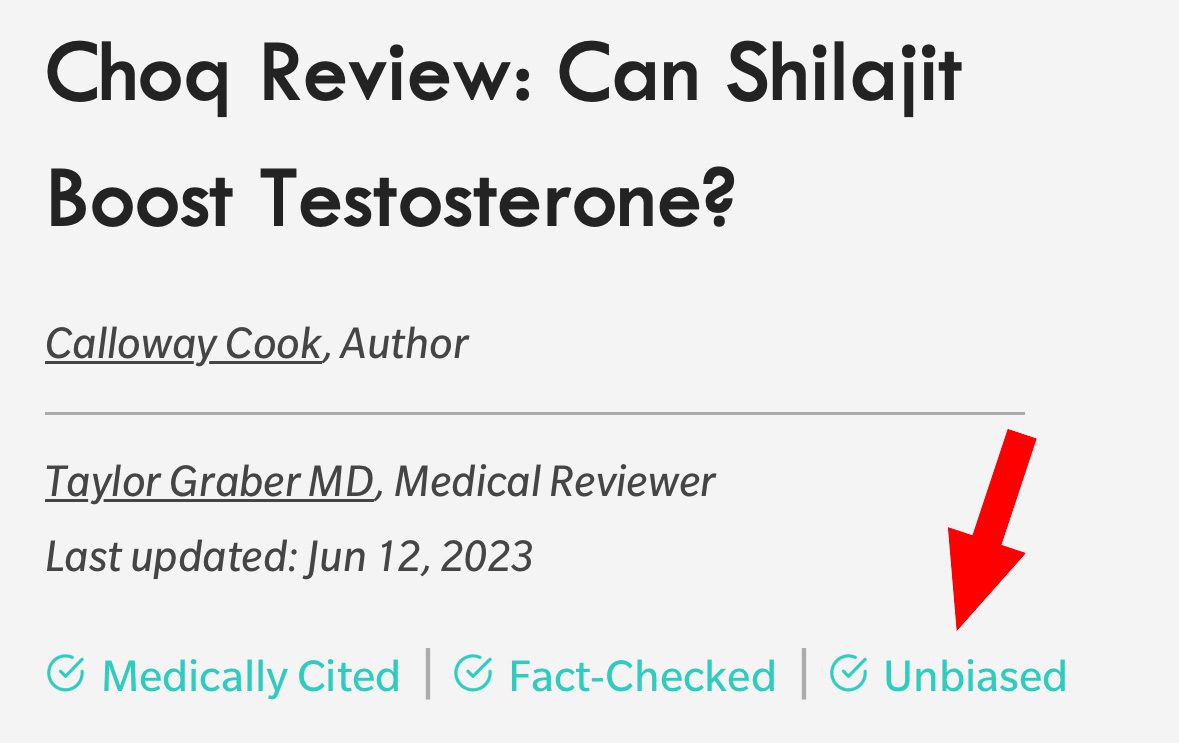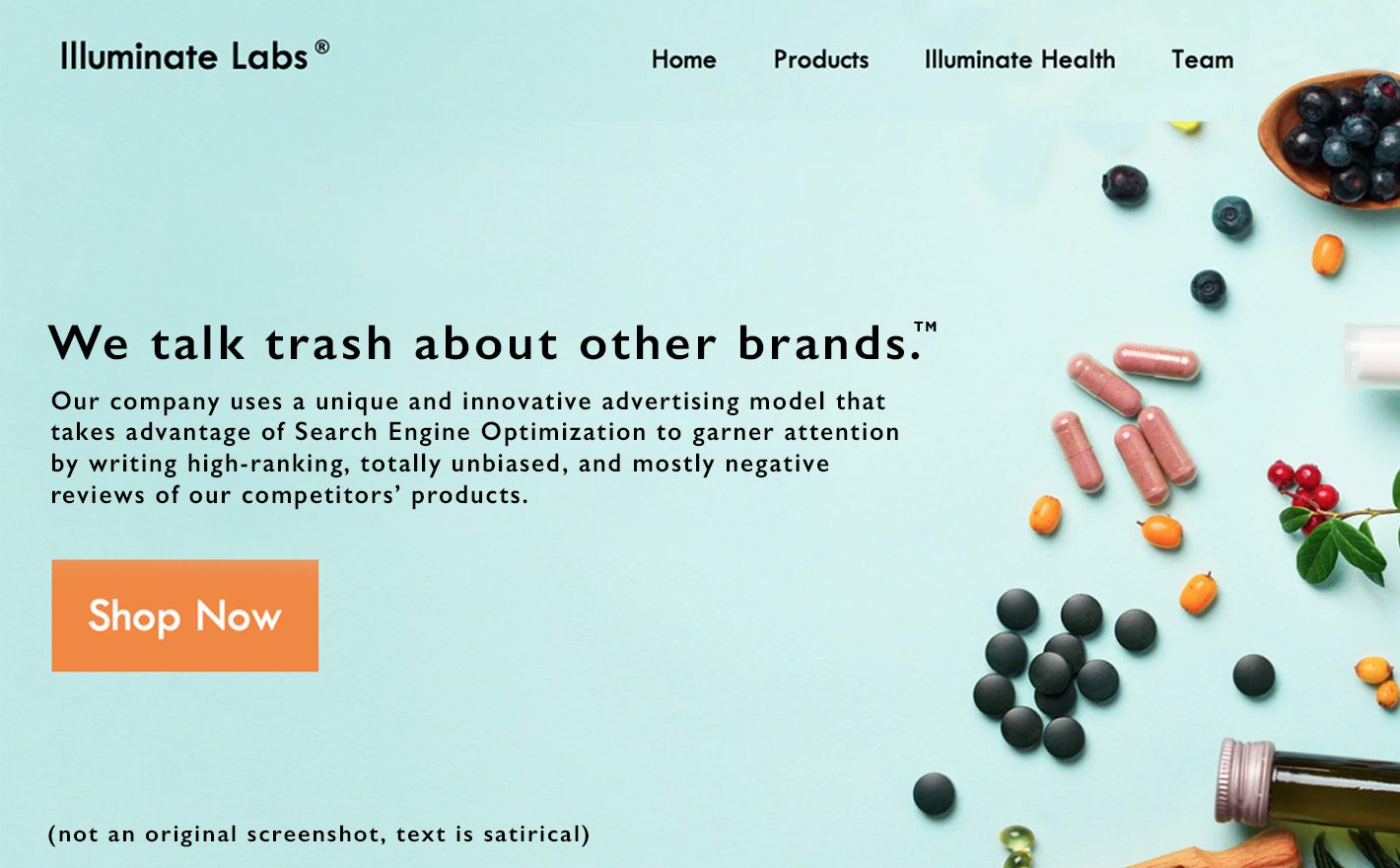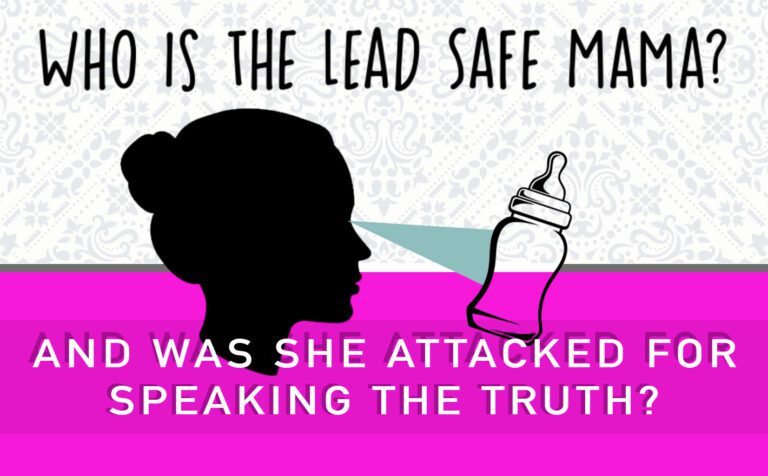It’s expected for a brand to share the occasional analysis of another company’s products. What’s never expected, though, is for a company to absurdly claim objectivity when doing so, and it’s practically unheard of for a company to base their entire advertising strategy on it.
Let’s say you’re talking to Jim, a BMW salesman, and you ask him his opinion of the new Mercedes SUV. Let’s also say that, at the end of his response, he added, “and I’m completely unbiased.” Obviously he’d be joking.
Over the last three years, Illuminate Labs has produced an encyclopedic quantity of articles that brutally criticize their competitors’ products, written either by their CEO, search engine marketing expert Calloway Cook, or one of their cadre of conventional medicine practitioners for hire, always accompanied by the preposterous claim that they’re somehow unbiased.
Shen we discovered that they’d written a hit piece on CHOQ, and saw these absolutely ridiculous badges right at the very top, we already got a good chuckle out of the article before we even launched into reading it.
Jim the BMW salesman was clearly joking around, but Illuminate Labs is serious as a heart attack. Nevertheless, they do make us laugh.

7/27/23 edit: it’s clear that Illuminate Labs read this article and agrees with us on this point, as they’ve now changed every article on their website to say ‘independent’ instead of ‘unbiased’. How meaningful the term ‘independent’ is, considering that this article is written by their CEO and reviewed by an anaesthesiologist they’re clearly paying, is another matter.
We put a heck of a lot of time into this article because there are so many issues with this company, so it’s on the longer side.
In case you don’t have time to read through all of it, the next section is a quick summary of our thoughts about their ‘unique’ business model.
This is the first of two articles on Illuminate Labs. Part I is an in-depth analysis of their online content, including examples of false claims they’ve made about their competitors’ products, how their marketing violates the law, and other major red flags.
In part II, we’ll give a thorough response to Illuminate Labs’ ‘unbiased’ review of CHOQ Daily and Shilajit, so stay tuned!
Illuminate Labs Review: Summary
Green Flags:
- Their products undergo extensive lab testing, which they publish on their site. In an industry that has so much tomfoolery, it’s heartening to see a company focusing on this important issue.
- They use studies to back up their product claims, however, the way they go about doing this is often illegal according to FDA regulations.
- They use standardized extracts, which means that they quantify the active constituents in their herbs.
- They employ physicians to write and review their articles (this is also highly problematic for a host of reasons, so we’re listing it as a both a green AND red flag; see our reasoning in the next section).
Red Flags:
(click on each one to go directly to that section)
- Their marketing strategy is highly questionable. Hiding behind the aegis of false objectivity, they churn out countless, mostly negative reviews of their competitors’ products. They’ve made so many enemies that someone has even gone out of their way to create websites like callowaycook.com, illuminatelabsorg.com, and eight more, all of which claim that the company commits fraud.
- In their ‘unbiased’ reviews, they often cherry pick their data in order to straw man their competitors’ ingredients, e.g. mentioning only negative studies and ignoring positive ones. They routinely omit research that doesn’t suit their self-serving narrative. This is highly unethical and a clear demonstration of extreme bias.
- They use dirt cheap ingredients not backed by proprietary research. For example, the kind of Ginseng they use can be obtained for about 3 cents per gram, and a bottle contains 12 grams, which is 36 cents worth of herbal material.
- They regularly violate FDA regulations pertaining to how supplement companies are allowed to talk about their products, illegally using disease terminology and even suggesting that their products can replace prescription drugs. This is a common rookie mistake made by smaller companies run by people with zero experience in the supplement industry.
- They have hardly any on-site reviews for a 3-year-old company (under 70 in total for all products). They’re also not on Trustpilot, the gold standard for independent reviews.
- They employ physicians (and a dietitian) to write or review all of their articles. Like we said, this is a major double-edged sword, so let’s call this one a half green, half red flag. Curious why? Read on to find out…
Illuminate Labs Review: the Full Breakdown
Red Flag #1 – Illuminate Labs’ Marketing Strategy is Highly Questionable
Illuminate Labs has published a vast array of articles that claim the impossible: unbiased reviews of their competitors’ products.
Typically, if someone begins an article with such a ridiculous claim, that’s a non-starter.
More often than not, their attempts to appear fair and balanced come with massive doses of inconsistency and cognitive dissonance. For example, they use affiliate links to make money on other companies’ products, even the ones that they say are low quality.
Needless to say, their marketing strategy is not well-liked by their competitors and has made them some enemies, evidenced by the fact that someone went so far as to make ten separate websites that attack the company, their CEO, and almost all of their authors and editors.
Here’s a full list of their hate sites:
It’s clear that whoever made these is pretty angry with Illuminate Labs, upset enough to use the word ‘fraud’ dozens of times. We found these sites to be a bit over the top but highly entertaining. One has to wonder if the anonymous author achieved their goal of making these practitioners want to distance themselves from such a controversial company.
We’re unsure of the accuracy of the slew of allegations on these sites, but at the very least, we can prove that Illuminate Labs purposely mischaracterizes the data in their competitor reviews, primarily by cherry picking their studies.
Red Flag #2 – Illuminate Labs Cherry Picks Their Data to Support False Accusations About Their Competitors’ Products
Illuminate Labs is a brand that goes out of its way to tell you that it’s honest. Even though they’re just another online supplement retailer, their website is a .org instead of a .com.
Their slogan is:

When we performed our analysis of their hit piece on us (which will be in Part II of this series), we noticed that their literature reviews seemed to be fairly superficial in a particularly self-serving way.
This is important because their assessments of the research are what they’re using to attack their competitors’ product claims. We decided to take a look at some of their other hit pieces to see if this was their standard operating procedure, and indeed that seems to be the case.
If you’re going to attack your competition by claiming that there’s no research to back up their claims, then you must be prepared to do a full literature review and leave no stone unturned.
Case Study: Illuminate Labs’ Cherry Picks Studies To Make False Claims About Onnit Alpha Brain
In their review of Onnit’s well-known nootropic, Illuminate Labs repeatedly omits positive studies in order to further their agenda of cutting down their competitors. Here are some examples:
CLAIM:
“Oat straw extract was shown in a clinical trial published in the Nutrients journal to have no benefits to cognition.”
REALITY:
Illuminate Labs cited a single study that failed to produce any results while ignoring the studies that showed statistically significant effects on cognitive function.
We were easily able to find four different studies that demonstrated the herb’s ability to enhance cognitive function (1, 2, 3, 4).
They also conveniently failed to mention the pharmacological effects of oat straw that are consistent with its ability to enhance focus, namely that it can inhibit monoamine oxidase B (MAO-B), an enzyme that breaks down dopamine as well as the structurally related neurotransmitter and CNS stimulant phenethylamine (5).
This is typical of their reviews, as they ignore any research that explores the mechanism of action of ingredients and focus only on human clinical trials. They also ignore all preclinical (animal) research in their attacks, yet still occasionally use animal studies to support ingredients that they sell.
While placebo-controlled randomized clinical trials are of course the gold standard, they’re not the only valid path to knowledge, and both animal research and in vitro research is still an essential part of our understanding of how herbs and other supplements work.
CLAIM:
“L-theanine is claimed by Onnit to be “shown to promote attention and reaction time” which is a surprising claim in our opinion.
That claim on their website is not cited, but due to the similar terminology it seems as though the brand is referencing this medical study titled “Effects of l-theanine on attention and reaction time response.” The study found that l-theanine had “no convincing [nootropic] effect” in healthy subjects, and had a nootropic effect only in individuals with anxiety.”
REALITY:
First, anxiety disorders are extremely common, and everyone experiences it occasionally as a result of specific situations where mental performance is important, such as taking tests or athletic competition. It thus makes complete sense that Onnit would include it in their product.
Additionally, just like with the oat straw example, Illuminate Labs clearly cherry picked their data with theanine, opting to focus on a single study that still showed benefits, but only in those prone to anxiety.
It didn’t take us long to find multiple examples of research demonstrating its procognitive properties. One study of thirty people with no psychiatric illness showed significant positive effects for both verbal fluency and executive function, a metric that includes attention (6).
Another study of healthy volunteers found that a single dose of theanine sped up reaction time and enhanced working memory (7).
Illuminate Labs also deceptively oversimplified the situation in order to bolster its attack on Alpha Brain by ignoring highly relevant research pertaining to theanine’s mechanism of action. Theanine has various pharmacological properties that make it highly plausible as a nootropic supplement, including its ability to antagonize glutamate receptors as well as modulate serotonin, dopamine, and GABA (8).
CLAIM:
“Vitamin B6 is easily obtainable from food sources, and we don’t understand why it would be included in a nootropic formulation as we can’t find any clinical evidence that its supplementation optimizes brain function in individuals who are not deficient in vitamin B6.”
REALITY:
This one is pretty inexcusable, as the authors could have at the very least talked about the nutritional biochemistry of vitamin B6 (pyridoxine) and its relevance to neurotransmitter synthesis.
Given B6’s mechanisms of action, it seems a little disingenuous to pretend that they ‘don’t understand why it would be included in a nootropic formulation’.
This practice of dumbing down and oversimplifying the discussion by omitting relevant mechanisms of action and only focusing on human clinical trials with hyperspecific endpoints is a common tactic of deception that Illuminate Labs employs in order to straw man their competitors’ products.
Here’s some pertinent information about how vitamin B6 works in the nervous system:
B6 is an essential cofactor for Aromatic L-amino acid decarboxylase (AAAD), an enzyme that catalyzes the conversion of tryptophan into serotonin and L-Dopa into dopamine.
One study found that lower concentrations of B6 were found in people with ADHD, with symptom severity strongly correlated to plasma B6 (10).
Vitamin B6 is also essential to the conversion of the excitatory neurotransmitter glutamate to the inhibitory neurotransmitter GABA and has been shown to be effective to reduce anxiety in non-deficient volunteers (11).
Children with ADHD have also been shown to be GABA deficient (12) and a drug called Gamalate B6®–which contains both GABA and B6–has been shown to have postive effects on focus (13).
Whether these underhanded tactics constitute fraud is unclear, but either way you slice it, it’s a clearcut case of extreme bias stemming from perverse incentives.
Finally, they also reviewed Alpha Brain Black Label on the same page and made the easily falsifiable claim that the minimum effective dose of citicoline is 500 mg according to the research, whereas the product under scrutiny only contains 250 mg.
It took us less than thirty minutes to find a study that demonstrates that citicoline improves attention at only 250 mg (9).
Red Flag #3 – Illuminate Labs Uses Cheap Ingredients Not Backed by Proprietary Research
For this part to make sense, it’s important to understand a little bit about how companies go about sourcing ingredients. Let’s say you work for a supplement company and you’re looking to source an Ashwagandha.
If you want to make the cheapest possible product, then you’re limited to generic Ashwagandha extracts. This means that the ingredient in your product does not have specific research performed on it by the company who manufactures it.
If, on the other hand, you truly value evidence-based product formulation, you will go out of your way to find an Ashwagandha extract made by a company that has evaluated their specific extract in human clinical trials.
Illuminate Labs uses cheap, generic ingredients in all four of their products. Just to see how much these ingredients cost, we looked into it.
Here’s how much it would cost us to obtain the exact same kinds of extracts that Illuminate Labs uses in their products (standardized to the same quantities of bioactives):
- Ginkgo – 8.3 cents per gram
- Ashwagandha – 2.6 cents per gram
- Ginseng – 2.8 cents per gram
- Cinnamon – 3.8 cents per gram
As an example of the value of their ginseng product, each bottle contains 12 grams, which would cost us 33.6 cents to obtain. They sell that product for $40 (or $15 subscription).
At CHOQ, on the other hand, we search high and low for the best of the best proprietary ingredients that are backed up by research and use them when available. Our Shilajit, Ashwagandha, and Tongkat Ali are all verified by human clinical studies, as are multiple ingredients in CHOQ Armor, Action 2.0, and our legendary APEX Glutathione, all dosed according to the research.
We often pay 5-10 times as much for these highly researched ingredients as our competitors do for their cheap generics. In some cases, such as with Tongkat 100, it’s probably closer to 50x the price, as it’s supported by 23 very expensive studies.

Red Flag #4 – Illuminate Labs Blatantly Violates FDA Regulations on Supplement Claims
It looks like Illuminate Labs is a big fan of using third-party lab testing, which we’re 100% behind. On that point, we salute them.
Another third-party test that might come in handy for them would be to have a lawyer or regulatory expert actually review their website, as it’s littered with blatant FDA violations.
It’s particularly ironic that a company giving off the impression of being a bastion of integrity would make so many careless mistakes in this area.
Many smaller supplement companies are completely unfamiliar with the FDA regulations that place limitations on how you’re allowed to talk about supplements. These regulations were put into effect in 1994 when the Dietary Supplement Health and Education (DSHEA) was passed.
The legislature allows supplement companies to make what are called structure/function claims, such as “supports healthy focus and memory” or “supports brain health”.
If, however, a claim is made that in any way states or implies that a supplement treats a disease, for example, “effective for ADHD” or “helpful for Alzheimer’s disease”, that’s considered a violation.
This also pertains to sharing research. So, for example, if you sell a supplement that has research showing that it treats diabetes, you’re still not even allowed to share any quotations from that study that talk about diabetes.
These regulations are beyond stringent. You’re not even allowed to include the title of the paper in your bibliography if that title includes references to the treatment of disease.
When a company refuses to play by the rules and outright claims that their product treats disease, that also gives them an unfair advantage over their competitors who are actually compliant with the law.
Here are some specific examples of Illuminate Labs’ many FDA violations:
- Their Ginseng product page uses quotes from studies such as, “ginseng is a promising treatment for fatigue. Both American and Asian ginseng may be viable treatments for fatigue in people with chronic illness.” It also says that ginseng has “proven effective in many diseases”.
- Their Ginkgo product page uses quotes from studies that make claims such as that ginkgo is good for patients with cognitive impairment, dementia, and neuropsychiatric symptoms.
- Their Ashwagandha product page uses quotes from studies that claim that the herb is anti-inflammatory, anxiolytic, and “an attractive agent for cancer chemoprevention in humans”. Any company that knows anything about these regulations understands that “thou shalt not use the C word” is literally the first commandment of DSHEA.
- Their Cinnamon product page uses quotes from studies that throw around various terms that are not legal according to the FDA, such as ‘antihyperglycemic’ (which means that it treats diabetes), ‘metabolic syndrome’, and ‘reduces hyperlipidemia’.
- An article titled ‘Adderall Alternatives’ suggests that their ginkgo and ginseng products are good replacements for Adderall. Here’s an example of a real FDA warning letter to a supplement company for suggesting that their product is an alternative to Adderall.
- An article about ginseng, which promotes their ginseng pills, suggests that the herb can both prevent and treat Alzheimer’s disease.
- Their site is littered with articles (1, 2, 3, 4) that promote their cinnamon capsules and claim that the herb treats diabetes.
PRO TIP: If Illuminate Labs has already taken these FDA violations down by the time you read this (or fixed any of their other questionable claims), then you can always use the Wayback Machine to find previous versions.
Red Flag #5 – Illuminate Labs Has Hardly Any Product Reviews and Isn’t on Trustpilot
According to the Wayback Machine, the Illuminate Labs website has been around for at least three years, so we’re assuming that that’s the approximate age of the company.
As of the time of this writing (July of 2023) they have four products. Adding up the reviews from all four (including their Ashwagandha, which has zero), we get a grand total of 63.
By contrast, CHOQ Shilajit alone has over 600 reviews.
If a supplement company has been open for over three years and has less than twenty reviews on average per product, then it may be more of a pet project than a serious business.
Illuminate Labs is also not on Trustpilot, which is the industry standard for third-party ratings. CHOQ has over 4,300 independent reviews on Trustpilot, with a current average of 4.8 stars, putting us in the top 10% of vitamin and supplement retailers on the platform.
Red Flag #6 – Illuminate Labs Exclusively Uses Conventional Medicine Practitioners to Write or Review Their Articles
In their totally unbiased article on CHOQ, they had this to say about my medical training:
“The Chief Scientific Officer of Choq is a “Doctor of Acupuncture,” and we’ll leave it up to consumers to decide if they believe a Doctor of Acupuncture is a good candidate to formulate and manage testing for ingestible testosterone supplements.”
It’s clear that Illuminate Labs is a big fan of the conventional medical system–the one that educates its doctors for close to a decade yet usually doesn’t give them a single class on nutrition, and does not provide training in the clinical use of vitamins, herbs, alternative therapies, or hardly any modalities other than prescription drugs and surgery.
Medical school of course provides impeccable training in areas like anatomy, physiology, biochemistry, and pharmacology, yet also inculcates its graduates with a philosophically impoverished, reductionistic, and highly mechanistic way of viewing health and disease that sees the patient as a collection of isolated systems and individual parts instead of a whole person.
Chinese Medicine, however, is thousands of years old and has its roots in Taoist philosophy, which is profoundly inspired by the natural world and understands the importance of seeing an individual instead of a statistic. It’s also the second-oldest (next to Ayurveda) system of herbal medicine on the planet.
On the way to getting my doctorate and medical license, I received over five hundred hours of training in medical herbology alone. I also took many hundreds of hours of classes in conventional medicine and medical science, including courses on:
- Anatomy
- Physiology
- Pathophysiology
- Microbiology
- Pharmacology
- Biomedical terminology
- Medical diagnostics, including labs and imaging
- Conventional treatment of disease
- Public health
- Evaluation of scientific literature
In addition, one of the five board exams that I took to get my license was exclusively on conventional medicine. For anyone who’s tried to get through any of my more technical blogs, you know that I speak the language of science.
The programs that I went through were designed to make their graduates extremely well-versed in the conventional medicine paradigm in order to facilitate our ability to communicate with physicians and also evaluate and publish research. In fact, every single course I took during my doctorate was on either conventional (AKA ‘Western’) medicine or research.
This is the reason I often refer to myself as ‘medically bilingual’.
I would be more impressed if Illuminate Labs worked with physicians who run integrative medicine practices that have clinical experience with herbs and nutrition, but it’s not apparent that that is the case. For example, Dr. Taylor Graber–the MD who reviewed and ‘fact-checked’ the article on us and coauthored the extremely sloppy analysis of Alpha Brain–is an anesthesiologist, a doctor who doesn’t actually treat patients.
We doubt that a physician whose specialty is making people go to sleep has much clinical experience with herbology or nutrition, let alone any training in it.
It’s a highly necessary and important specialization, no doubt, but asking an anesthesiologist about supplements is a bit like asking a software engineer for advice on how to grow your own vegetables.
Illuminate Labs also employs a registered dietitian (RD). It may interest you to know that the American Dietetic Association–the group that dictates their education–is extremely biased against vitamin and mineral supplementation, teaches their practitioners that pesticides aren’t bad for you, that organic food is pointless, and even takes money from companies like Hershey, Wendy’s, and Coca Cola…not to mention pharmaceutical companies like Bayer, who currently owns Monsanto.
Here’s a quote from an article in the Guardian about the rampant corruption that plagues the American Dietetic Association:
“Among its staff and board members are current and former public relations staff for companies that represent big food, as well as consultants or employees for large food entities like Monsanto, Sodexo, the Sugar Association, Bayer and the International Food Information Council, an industry front group.”
RDs essentially comprise the nutritional wing of the broken and decaying conventional medicine monolith that so many people have grown weary of, due in large part to its obsession with chemicals and its reluctance to endorse natural, common sense treatments.
Many of Illuminate Labs’ claims regarding the lack of efficacy for vitamins carry the distinct aroma of a registered dietitian’s bias against nutritional supplements. For example, the hit piece on Alpha Brain we discussed in the section on cherry-picking studies was reviewed by their RD and shot down Onnit’s use of vitamin B6 even though–as we’ve discussed–its relevant effects on serotonin, dopamine, glutamate, and GABA are all well-documented and many people with attention issues are low in B6.
This would all be bad enough, even if these conventional medicine practitioners were actually taking the time to do truly rigorous reviews of the existing literature, but as we’ve clearly demonstrated, these articles are sloppy, evidenced by their repeated omission of both positive human clinical trials and mountains of preclinical and in vitro research that enhance the plausibility that an ingredient can effect a positive outcome.
Conclusion
Illuminate Labs goes out of their way to imply, ad nauseam, that they’re the industry leader when it comes to transparency and evidence-based products, but at this point, we believe it’s safe to conclude that they may not be the bastion of integrity they claim to be.
Their behavior is frankly bizarre.
The company will tell you that a product is basically no good, then give you an affiliate link to buy it so they can make money on your purchase…of a product they don’t believe in.
Between the blatant FDA violations, unethical misrepresentation of the scientific literature that pertains to their competitors’ products, unnecessarily aggressive advertising tactics, extremely cheap ingredients that lack proprietary research, and lack of significant reviews after three years in business, it’s easy to see why this company doesn’t seem to be selling any products.
Lastly, if you got this far, then congratulations! You’re probably part of a small minority of extremely patient readers (or maybe you’re Joe Rogan or Aubrey Marcus?).
Also, don’t forget to stay tuned for Part II, where we provide detailed responses to their article on CHOQ Daily.
References
- Martinez-Horta, S., Ivanir, E., Perrinjaquet-Moccetti, T., Keuter, M. H., & Kulisevsky, J. (2021). Effects of a Green Oat Herb Extract on Cognitive Performance and Neurophysiological Activity: A Randomized Double-Blind Placebo-Controlled Study. Frontiers in neuroscience, 15, 748188.
- Kennedy, D. O., Jackson, P. A., Forster, J., Khan, J., Grothe, T., Perrinjaquet-Moccetti, T., & Haskell-Ramsay, C. F. (2017). Acute effects of a wild green-oat (Avena sativa) extract on cognitive function in middle-aged adults: A double-blind, placebo-controlled, within-subjects trial. Nutritional neuroscience, 20(2), 135–151.
- Berry, N. M., Robinson, M. J., Bryan, J., Buckley, J. D., Murphy, K. J., & Howe, P. R. (2011). Acute effects of an Avena sativa herb extract on responses to the Stroop Color-Word test. Journal of alternative and complementary medicine (New York, N.Y.), 17(7), 635–637.
- Dimpfel, W., Storni, C., & Verbruggen, M. (2011). Ingested oat herb extract (Avena sativa) changes EEG spectral frequencies in healthy subjects. Journal of alternative and complementary medicine (New York, N.Y.), 17(5), 427–434.
- Perrinjaquet-Moccetti, Tania & Wullschleger, C & Schmidt, A & Aydogan, Cem & Kreuter, Matthias. (2006). Bioactivity-based development of a wild green oat (Avena sativa L.) extract in support of mental health disorders. Zeitschrift für Phytotherapie.
- Hidese, S., Ogawa, S., Ota, M., Ishida, I., Yasukawa, Z., Ozeki, M., & Kunugi, H. (2019). Effects of L-Theanine Administration on Stress-Related Symptoms and Cognitive Functions in Healthy Adults: A Randomized Controlled Trial. Nutrients, 11(10), 2362.
- Baba, Y., Inagaki, S., Nakagawa, S., Kaneko, T., Kobayashi, M., & Takihara, T. (2021). Effects of l-Theanine on Cognitive Function in Middle-Aged and Older Subjects: A Randomized Placebo-Controlled Study. Journal of medicinal food, 24(4), 333–341.
- Nathan, P. J., Lu, K., Gray, M., & Oliver, C. (2006). The neuropharmacology of L-theanine(N-ethyl-L-glutamine): a possible neuroprotective and cognitive enhancing agent. Journal of herbal pharmacotherapy, 6(2), 21–30.
- Mcglade, Erin & Locatelli, Allison & Hardy, Julia & Kamiya, Toshikazu & Morita, Masahiko & Morishita, Koji & Sugimura, Yoichiro & Yurgelun-Todd, Deborah. (2012). Improved Attentional Performance Following Citicoline Administration in Healthy Adult Women. Food and Nutrition Sciences. 03.10.4236/fns.2012.36103.
- Landaas, E. T., Aarsland, T. I., Ulvik, A., Halmøy, A., Ueland, P. M., & Haavik, J. (2016). Vitamin levels in adults with ADHD. BJPsych open, 2(6), 377–384.
- Field, D. T., Cracknell, R. O., Eastwood, J. R., Scarfe, P., Williams, C. M., Zheng, Y., & Tavassoli, T. (2022). High-dose Vitamin B6 supplementation reduces anxiety and strengthens visual surround suppression. Human psychopharmacology, 37(6), e2852.
- Puts, N. A., Ryan, M., Oeltzschner, G., Horska, A., Edden, R. A. E., & Mahone, E. M. (2020). Reduced striatal GABA in unmedicated children with ADHD at 7T. Psychiatry research. Neuroimaging, 301, 111082.
- Novell, R., Esteba-Castillo, S., & Rodriguez, E. (2020). Efficacy and safety of a GABAergic drug (Gamalate® B6): effects on behavior and cognition in young adults with borderline-to-mild intellectual developmental disabilities and ADHD. Drugs in context, 9, 212601.




